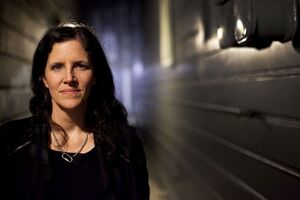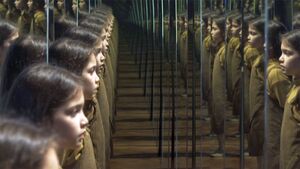De 35ste editie van het International Documentary Film Festival Amsterdam (IDFA) gaat op 9 november van start met de wereldpremière van de Nederlandse film All You See (Al wat je ziet). De eerste lange documentaire van Niki Padidar, die op haar zevende Iran verliet. Zij confronteert de kijker op originele wijze met ervaringen van zogenaamde nieuwkomers in Nederland.
Het programma strekt zich weer uit van de Internationale Competitie voor min of meer klassieke documentaires, en de Envision Competitie voor meer gedurfd werk, tot het DocLab-programma vol bijzondere VR- en andere nieuwe media-ervaringen. Onder de Nederlandse bijdragen nieuw werk van beginnende naast gerenommeerde makers, zoals Coco Schrijber, Jos de Putter en Clara van Gool, en het filmmakersechtpaar Peter en Petra Lataster-Czisch. Met de hervertoning van Crazy eert IDFA de dit jaar overleden Heddy Honigmann. Around Masculinity is een van de Focusprogramma’s.
Eregast is dit jaar de zeer geëngageerde filmmaker en activist Laura Poitras, in 2015 onderscheiden met een Oscar voor Citizen Four. Haar nieuwste werk is het in Venetië met de Gouden Leeuw bekroonde All the Beauty and the Bloodshed, nu hier op IDFA. Een gedreven en aangrijpend portret van fotograaf Nan Goldin, en van haar strijd met het beruchte farmaceutische bedrijf van de Sackler familie.
Waar je voor staat
Op de onlangs gehouden persconferentie rondde artistiek directeur Orwa Nyrabia de presentatie van het programma af met een opmerking over de selectie. Het is, zo stelde hij, ‘not only a judgement, but also a statement’. Wat ik vrij vertaal als: je kiest niet alleen de films die het beste zijn, maar ook die laten zien waar je voor staat.
Dus vraag ik later in een onlinegesprek met Nyrabia: waar staat IDFA voor? Wat is dat ‘statement’? Ik spreek de van oorsprong Syrische festivalorganisator, filmmaker en producent in het Engels, en ik laat de term ‘statement’ onvertaald.
Hij moet even lachen, om dan op te merken dat het een moeilijke vraag is.
“Want IDFA is een groot evenement met veel verschillende activiteiten met allemaal hun statements. Je kan dat niet in een simpele slogan samenvatten, zo werk ik nu eenmaal niet. IDFA maakt juist ruimte voor een complex commentaar op de wereld van vandaag.”
Poitras

“Dus als wij bijvoorbeeld Laura Poitras kiezen als eregast dan maken wij beslist een statement. Zeker gezien haar nieuwste film over kunstenaar en activist Nan Goldin. Dat statement is niet dat Poitras de allerbeste filmmaker van de wereld is. Het statement is dat we geloven in wat ze doet. Het betekent dat je kijkt naar de rol van kunst en cultuur bij het scheppen van een meer open, meer… (Nyrabia zoekt even naar het woord) democratische samenleving.”
Om daar aan toe te voegen dat aandacht vragen voor het artistieke experiment zelf ook een statement is. Zoals gebeurt in de Envision-competitie, waar filmmakers de artistieke grenzen opzoeken. En ook in het Paradocs-programma en het DocLab met nieuwe media.
Jonge mensen
Dat kan botsen met het idee dat de documentaire vooral veel mensen moet zien te bereiken. Tegenover dat commerciële standpunt stelt Nyrabia dat “ik graag inzet op een paar jonge mensen die nieuwsgierig zijn en die door het zien van films op IDFA en het bijwonen van andere activiteiten misschien iets anders naar de wereld gaan kijken. Het gaat er niet om films voor een groot publiek te maken. Het gaat er om eerlijk en oprecht te zijn. Liever lastige vragen stellen dan onze vooroordelen bevestigen.”
“Ik weet zeker dat die jonge mensen er zijn. De oudere generatie denkt misschien dat het allemaal TikTokkers zijn, maar we hebben het hier over miljoenen jonge mensen. Sommigen brengen al hun tijd door op TikTok, maar anderen zien hier niets in. En er zijn er ook die creatieve toepassingen vinden.”
“Ik geloof dat het heel menselijk is dat we proberen vast te stellen wat goed is om te doen en wat slecht, om vervolgens op onze lauweren te rusten. Film moet proberen die rust te verstoren. Het statement van IDFA betreft niet alleen een platform voor een open benadering van wat film is. Het strekt zich ook uit tot nadenken over de vraagstukken van samenleving en politiek vanuit een standpunt dat minder rechtlijnig en gesimplificeerd is dan vaak het geval is.”
Artistiek en politiek
Wanneer ik dat probeer samen te vatten met de opmerking dat er twee kanten aan die statements zitten, artistiek en meer politiek, moet Nyrabia lachen, en stelt met nadruk: “Het is een en hetzelfde.”
“In principe is alles wat IDFA doet het resultaat van lange en grondige discussies met het team. Het is mijn taak om de grote lijnen en de strategie van ons werk uit te zetten. Maar ik doe niets alleen. Het is een groot team van kundige mensen waar ik in geloof. En naast onze relatie met het publiek heeft IDFA nog veel meer statements richting professionele bezoekers”, lacht Nyrabia.
“IDFA is ook een toonaangevend festival voor de wereldwijde gemeenschap van filmprofessionals. We dragen bij aan zaken die onderwerp van gesprek zijn in de industrie. Zo hebben we het op IDFA bijvoorbeeld ook over filmkritiek. Vorig jaar jaar ging het over representatie, dit jaar willen we het hebben over het zogenaamde ‘slow criticism’. De strijd tegen de commercialisering van de filmkritiek.”
Seriemoordenaar
“En er is meer. Het zijn interessante tijden voor de documentaire-industrie, want streamers en andere grote spelers hebben het ontdekt als iets om in te investeren. Wat betekent dit voor de vrijheid van de kunst van de documentaire? Een voorbeeld van films die een groot publiek moeten bereiken is de opkomst van de seriemoordenaar als onderwerp. Die heeft een sterrenstatus gekregen. Dit neigt naar exploitatie van een van onze zwakke plekken, van onze fascinatie voor het kwaad. Wat doet dat uiteindelijk op het niveau van de samenleving met ons ethische en filosofische begrip van kunst en de wereld? Ik denk dat een dergelijke exploitatie van het publiek zeker een onderwerp van discussie moet zijn.”
All You See

Terug naar het filmprogramma, en met name de openingsfilm All You See. Niki Padidar laat op een ogenschijnlijk simpele, maar tevens ongewone en heel directe manier het gevoel van vervreemding zien dat vier ‘nieuwkomers’ in Nederland bevangt. Het gevoel niet gezien maar bekeken te worden. Zegt deze film ook iets over het soort statements dat IDFA maakt?
“Jazeker. Het is een film die ons op een heel elegante manier aanspreekt over zaken die we liever niet zien. Een heel oprechte, ogenschijnlijk eenvoudige film die ons uitnodigt om in te zien dat het wel heel makkelijk is om extreem rechts of zelfs fascisme de schuld van alle racisme te geven. Terwijl we negeren hoe we zelf een heleboel racisme op een heel alledaagse manier ten toon spreiden. Dat zijn lastige kwesties, en ik geloof dat een film als deze ons daarvoor de ogen kan openen.”
Subjectief
“Als het gaat om statements is het goed te bedenken dat iedereen die altijd maakt. Festivalprogrammering is een subjectief proces, ook al hebben festivals van oudsher de neiging te pretenderen dat ze kunnen beoordelen wat goed is. Maar wanneer we het hebben over een oprechte, artistieke benadering van ons werkterrein denk ik dat we er niet omheen kunnen dat het subjectief is.”
“In een master talk op IDFA zei Gianfranco Rosi twee jaar geleden dat filmmaken geen olympische 100 meter-wedstrijd is. Er bestaat geen betere film. Er is alleen een film die door iemand beter wordt gevonden. Er zijn geen objectieve maatstaven. Het is dus niet waar dat we de beste kiezen. De criteria veranderen voortdurend. Wat ik nu vind zal over een paar maanden weer anders zijn. Als ik dan dezelfde films opnieuw zie zal ik over aan aantal waarschijnlijk anders denken.”
Cannes
“Ik vind dat we de neiging moeten onderdrukken om festivalprogrammering, filmdistributie en filmkritiek als een objectief stempel te zien. Maar we zin onderdeel van de internationale gemeenschap. Toen Cannes vragen kreeg over de genderkwestie was het antwoord: daar staan wij buiten, het is de industrie, wij staan aan het eind van de pijplijn. Dat is een onaanvaardbaar ontwijken van de vraag. We staan niet aan het eind van de pijplijn. We hebben invloed, we hebben verantwoordelijkheid.”
Dus iedere beoordeling is ook een statement.
“Absoluut. Ons oordeel is niet objectief. Het is waar wij als team, of in ieder geval een aantal van ons, op dit moment veel waardering voor hebben.”
IDFA vindt van 9 t/m 20 november plaats in Amsterdam en een groot aantal andere locaties in Nederland. Deze openingsfilm All You See is tegelijkertijd te zien in Theater Carré in Amsterdam en in 35 filmtheaters door het hele land. Voor het Amsterdamse festivalprogramma met films, nagesprekken, events, immersieve en interactieve installaties zie: www.idfa.nl
